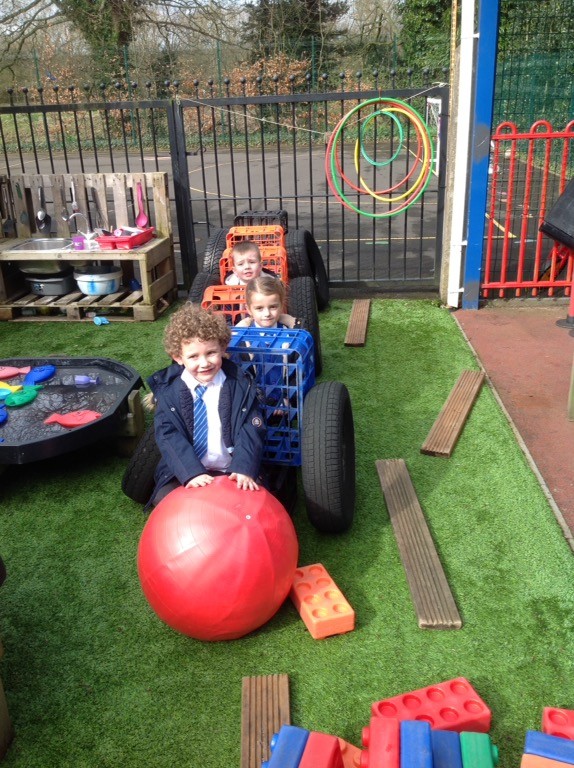Our Christian Values and Distinctiveness, alongside our School Mission Statement of ‘Learning, Growing and Inspiring through God’s Love and Grace’, are at the heart of our curriculum and all that we do at Samlesbury.
The Early Years Foundation Stage Curriculum
Children's learning is largely play-based using high quality, age appropriate resources. Children are supported to join in both child-initiated and adult led activities.
Our infant class incorporates both EYFS and Key Stage 1 which provides unique opportunities for continuity and progression for our children as they have the same teachers and staff for three years. Our reception children have their learning tailored to their development but also benefit from working with the older children who are fantastic role models for their younger class mates.
Our practice is largely informed by the Early Years Foundation Stage (EYFS) Framework which is adapted to meet the needs of each individual child. Further information is available on the Foundation Years website.
Within this framework there are four guiding principles:
- Every child is a unique child, who is constantly learning and can be resilient, capable, confident and self-assured
- Children learn to be strong and independent through positive relationships
- Children learn and develop well in enabling environments with teaching and support from adults, who respond to their individual interests and needs and help them to build their learning over time. Children benefit from a strong partnership between practitioners and parents and/or carers.
- Children develop and learn at different rates. The framework covers the education and care of all children in early years provision, including children with special educational needs and disabilities (SEND).
There are also 7 areas of learning and development identified in the EYFS framework:
Personal, social and emotional development (PSED)
PSED helps children to develop a positive sense of themselves and others. We aim to support children to be confident and as independent as possible. Activities support children to develop their social skills, a respect for others and the curiosity to want to explore and learn.

Communication and language (CL)
CL supports children to develop their understanding and expressive language. A language rich environment is provided and differentiated to meet each child's individual needs. Developing communication skills linked to speaking and listening is a key part of the work we do.
.jpg)
.jpg)
Physical development (PD)
PD helps children to learn by being active. This helps children to gain confidence, develop their coordination and movement. Children are supported to make healthy choices about the food they eat both at snack time and at lunchtime.

Literacy
We provide many activities to support the development of reading and writing skills. We have a wide range of books and other reading materials within the learning areas which children can access independently and with others. The development of writing skills is supported not only via traditional writing activities but creatively through, for example the use of computers and messy activities.
.jpg)
.jpg)
.jpg)
Mathematics (MD)
Children are provided with a wide range of activities to help them to develop an understanding of number, using number and shape, space and measures.

.jpg)
Understanding of the World ( UoW)
UoW provides children with the opportunity to develop the knowledge, skills and understanding that help them to make sense of the world. To help children to do this we enable them to use a range of tools and technology safely. We provide opportunities for them to encounter creatures, people, plants and objects in their natural environments and in real life situations. Children are supported to participate in practical 'experiments' and to explore a wide range of materials. Our Forest Schools work is a essential part of this area of learning.
photo
Expressive Arts and Design (EAD)
EAD enables children to explore and play with a wide range of media and materials. Children are also provided with opportunities and support to share their thoughts, ideas and feelings through a variety of activities in art, music, movement, dance imaginative and role play activities, design and technology.
.jpg)
Our EYFS Curriculum Goals set out what we aim for our children to achieve within these areas of learning as part of their time in the Early Years.
Characteristics of Effective Learning
Threading through our EYFS curriculum are the ‘characteristics of effective teaching and learning’ which helps us to think about how individual children learn. This enables us to adjust our teaching and our environments to support children’s development.
These ‘characteristics’ are:
- playing and exploring – children investigate and experience things, and ‘have a go’
- active learning – children concentrate and keep on trying if they encounter difficulties, and enjoy achievements
- creating and thinking critically – children have and develop their own ideas, make links between ideas, and develop strategies for doing things
If you'd like to know more about our EYFS and Infant class curriculum, please see our curriculum overview or contact Miss Wallace for more details.
There are many support services available to enable our children to get the very best start to school they can. One of these services is the school nursing team. The presentation below contains all the information you need to know about this team along with contact details if you feel their services may be of benefit to you and your child.
 Lancashire Nursing Team presentation for reception parents 2025
Lancashire Nursing Team presentation for reception parents 2025